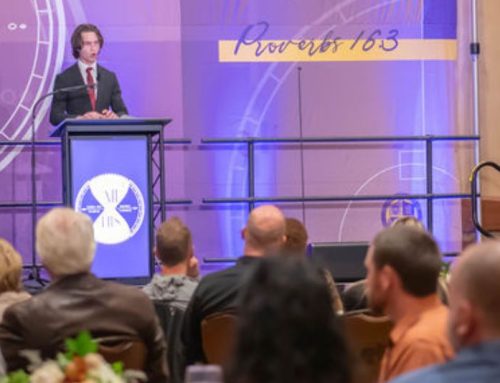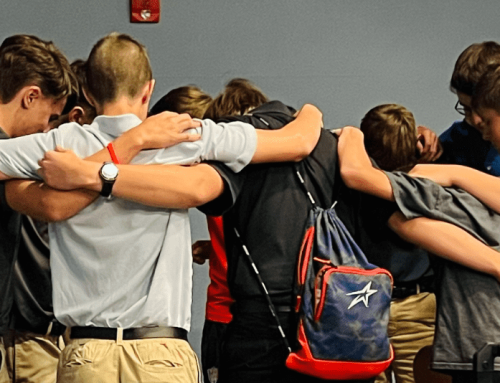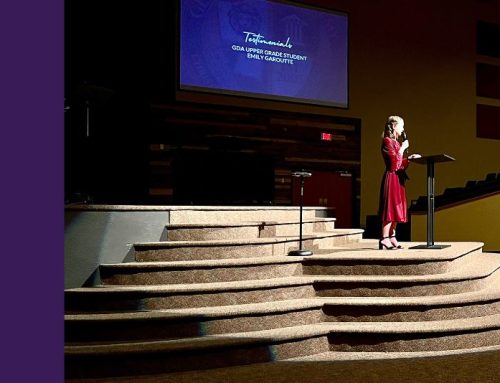From the moment personal computing became possible, the debate over its merits and drawbacks of technology in education began to rage. And I’m as technology-wary as the next classical education devotee, but even I can’t deny the possibilities: instantaneous answers to scientific questions; astute explanations for complicated concepts; great books delivered in two days or less; quality drawing lessons from the comfort of my dining room table.
In the classical education and Charlotte Mason circles, we talk about spreading out a feast of knowledge for our students and simply inviting them to the table. Our technological devices can make this feast bigger, wider, deeper, and more accessible than it ever has been. But we can’t forget that – as valuable a tool as the internet and all its spoils can be – it is still just one tool that we use to understand our world. Titus 2:11-13 says that God’s saving kindness “trains us to avoid ungodly lives filled with worldly desires so that we can live self-controlled, moral, and godly lives in this present world.”
And while plenty of people live with self-control, morality, and godly principles right alongside their technological devices, many – especially young people – struggle to reconcile these aspects of the modern world. For better or worse, our lives are strongly tied into the virtual world nowadays – email is the lifeblood of most workers’ communication, social media helps us connect to one another, and we can even order (and save money on!) dinner on the way home via our apps. But when we become too dependent on this technology, we lose touch with what’s important around us. And some people can become completely reliant on technology, slipping into a full-blown addiction.
While technology addiction isn’t yet officially classified as a mental disorder, it is an umbrella term professionals use to describe a variety of obsessive compulsive online behaviors. These behaviors can cause chemical changes in the brain similar to those changes observed in people with substance abuse disorders. Those with an addiction to technology may stay online longer than they originally intended, use technology as a way to escape life’s problems, ignore what’s happening in real time in favor of what’s happening in the virtual world, and feel anxious when they’re away from the device. They typically make more than one unsuccessful attempt at controlling, cutting back on, or stopping their internet use. These addictive behaviors interfere with everyday life, as well as leave the sufferer with physical maladies like weight changes, headaches, backaches, dry eyes, and carpal tunnel syndrome. And we have license to worry; 6-10% of smartphone users display signs of addiction, according to professor Phil Reed of Swansea University. Even more bleak: a study published in the International Journal of Neuropsychiatric Medicine concluded that one in eight Americans struggles with problematic internet use.
While these statistics are scary, knowing the facts puts the power back into our hands. As classical educators, we know the power of conversing in person, reading real books, and having real experiences. All of these activities combat technology addiction and show our kids that, while their devices may hold a valuable place in their lives, there are even more valuable experiences to be had. In fact, I’m convinced it’s this conscious re-aligning of priorities in the face of our increasingly “on the cloud” society that is causing a resurgence in more intentional education models, such as the classical and Charlotte Mason styles.
As I tread the classical education path with my students, I’m so encouraged that we parents have the opportunity each year to gather at a conference and learn from some of the educational leaders in our country. This year, the focus on technology will be especially valuable. I’m looking forward to getting tips on using technology to support our efforts to fill our children’s minds with good, beautiful knowledge. I’m hoping to gather more information on how to recognize signs that my children may be too dependent on their devices, and how to set realistic boundaries. I’m excited to get motivated to partner with my child’s teacher for the upcoming school year so that we can both be the best leaders we can be. And most of all, I’m looking forward to being blessed with real-time, deep conversation with like-minded teachers and parents, and I’m confident that this conference will be a blessing to all who attend!

Want to learn about how technology impacts education? GDA is hosting the 2019 Classical Education Conference on August 1st and 2nd from 9 AM – 3 PM at the Glendale Campus (located at 2110 S Blackman Rd Springfield, MO 65809). Keynote speakers: Dr. Zustiak, Dr. Cooper and Jami Glenn. Lunch is included. Attendees may come for Thursday, Friday or both days.
Thursday, August 1st
8:30 AM – 9:00 AM: Registration
9:00 AM – 10: 00 AM: Workshop with Jami Glenn
10:00 AM – 11:00 AM: Setting Healthy Boundaries for Kids with Dr. Zustiak
11:00 AM – 12:00 PM: Workshop with Dr. Cooper
12:00 PM – 1:00 PM: Lunch
1:00 PM – 3:00 PM: Technology and the Effects on the Brain with Dr. Zustiak
Friday, August 2nd
8:30 AM – 9:00 AM: Registration
9:00 AM – 10:00 AM: Workshop with Jami Glenn
10:00 AM – 11:00 AM: Biblical Self-Esteem vs. Wordly Self-Esteem with Dr. Zustiak
11:00 AM – 12:00 PM: Workshop with Dr. Cooper
12:00 PM – 1:00 PM: Lunch
1:00 PM – 3:00 PM: Pornography + Technology with Dr. Zustiak
***Childcare will be available for children 5 and up! Students will participate in a program called “Play in a Day.” Please provide a packed lunch for your child. The cost is $25 for both days or $15 for one day of childcare.
Purchase tickets here!






